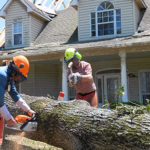NEW YORK—When the COVID-19 outbreak hit New York City, makeshift medical facilities were set up across the city to treat patients, and the military arrived to help overwhelmed law enforcement officers maintain order, run testing facilities and ensure safety.
Joshua Choquette, a chaplain endorsed by Texas Baptists and captain in the Air National Guard, volunteered to go to New York City to minister to military personnel stationed there.
Doug Carver, executive director of chaplaincy for the North American Mission Board said a growing number of Southern Baptist chaplains also have been mobilized in support of Guard units in multiple states.
“They are distributing food to the needy, coordinating community relief efforts with local religious leaders and advising their senior military leaders on the safety, health and spiritual welfare of their troops,” Carver said.
Serving military at temporary medical center

Choquette and two other Texas Baptist-endorsed chaplains began serving in 15 sites in Manhattan, Bronx, Brooklyn and Staten Island. The largest—the Jacob K. Javits Convention Center—was turned into a temporary medical center with more than 4,000 beds for COVID-19 patients.
Choquette cared for the military stationed in these sites, providing counseling, spiritual guidance and worship services.
He reported a large number of personnel asking spiritual questions, and he noted the worship services had large attendances.
For many people in New York, it marked the first time they have thought about their spiritual security in a long time, Choquette said. In the midst of a strong secular culture, fear and anxiety caused by turbulent times has caused many to ask deep questions, he noted.
“People are relying a lot more on prayer,” Choquette said. “And that’s people who aren’t even spiritual. It has put them a lot closer to death, or maybe they’ve lost a loved one, and so they have questions they’ve never had before.”
Sign up for our weekly edition and get all our headlines in your inbox on Thursdays
‘No end date … lot of unknowns’
In addition to supporting the spiritual needs of the military stationed in the city, Choquette also helped the military leadership refocus from a mission-based to needs-based mindset. The military traditionally operates around concrete missions with absolute goals, he explained.
“One of the ways this mission is unique is that there is no end date. There’s a lot of unknowns, which is not usually how the military operates,” he said. “And that lack of knowledge, along with the stress of worrying about their families, creates a lot of fear.”
The current mission, which has no end date and no clear goal for the military beyond maintaining order, requires a focus on the soldiers’ needs, he said.
As a chaplain, Choquette listens to individual problems and needs, and though he maintained confidentiality, he was able to convey general concerns and feelings to the leadership and suggest changes to boost mental and emotional health.
Just before Easter—when many predicted the impact of the virus would peak in the city—Choquette noted the cry for death to be pushed back across New York City, just as Jesus pushed back death with his resurrection. He prayed that this parallel of death and life would not be lost on the city’s residents and they would come to faith in Christ.
Prayer requested
Choquette was a Wiccan for 11 years, until “God hit … with full force,” he said. Since then, he has been devoted to sharing the hope and love he found in Christ with others.
He has been a military chaplain more than six years and has been serving in that capacity full-time for three years. He serves in the New York Air National Guard as 109th Airlift Wing chaplain and was endorsed by the Texas Baptists’ chaplaincy program in 2016. He volunteered to move down from upstate New York to New York City during the COVID-19 crisis, even though it meant being apart from his wife and four daughters for an indeterminate time.
Choquette asked Texas Baptists to pray for him and the other chaplains who are facing emotional hardships, such as being unable to see family for long periods of time. He also asked for prayer for chaplains who return home from hospitals every night and worry about potentially spreading the virus to their families.
Above all, Choquette encouraged churches to continue providing community and support despite being physically separated. The first churches often could not congregate due to persecution, and yet their numbers grew exponentially during that time, he said. Choquette implored churches to use this time wisely and to minister to those around them who do not have an eternal hope.
“The best thing we have is prayer and unity,” he said. “In many ways, this is an opportunity for the church. We need that closeness and support for each other, and we need to share it with the world.”
With additional reporting by Brandon Elrod of the North American Mission Board.














We seek to connect God’s story and God’s people around the world. To learn more about God’s story, click here.
Send comments and feedback to Eric Black, our editor. For comments to be published, please specify “letter to the editor.” Maximum length for publication is 300 words.